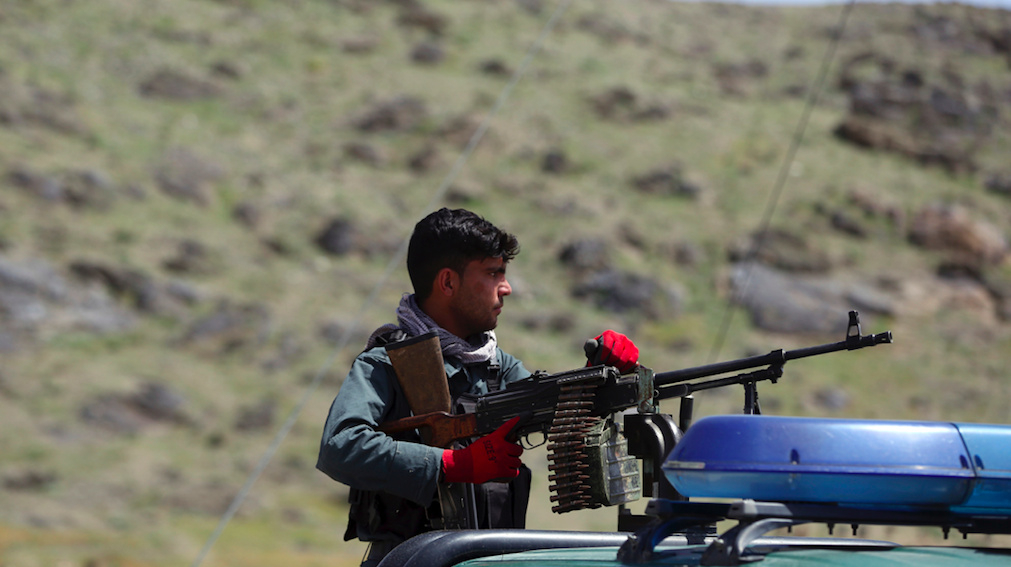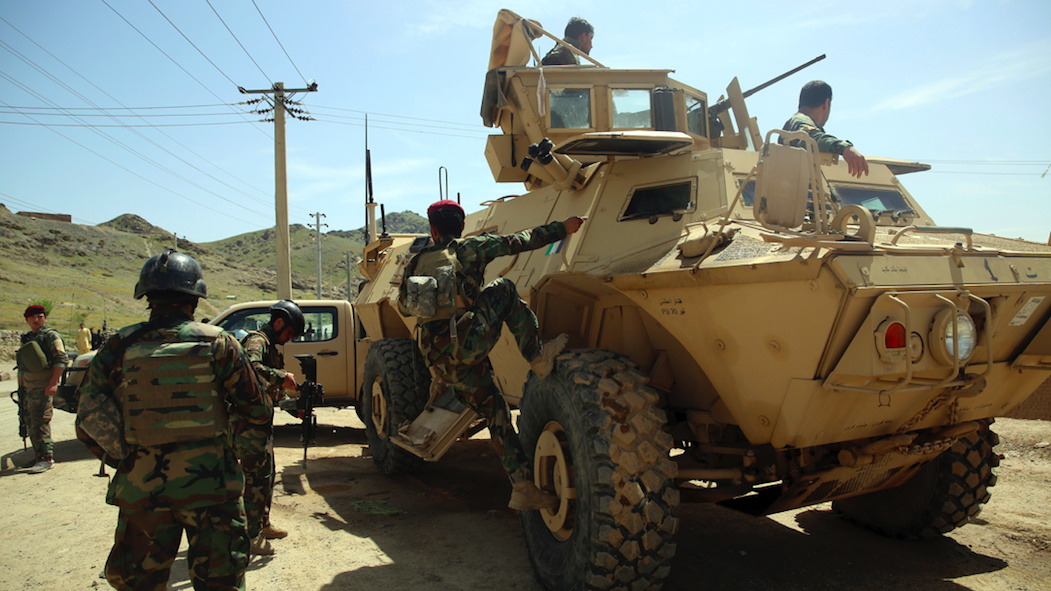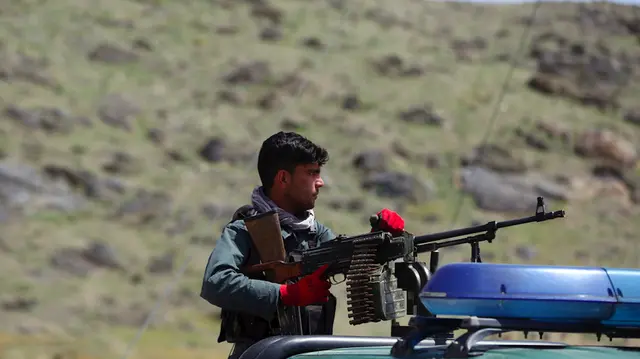
An Afghan policeman stands guard at the site of a suicide bomb attack on the outskirts of Kabul, Afghanistan, April 29, 2020. /AP
Editor's note: Hamzah Rifaat Hussain is a former visiting fellow at the Stimson Center in Washington, and currently serves as assistant researcher at the Islamabad Policy Research Institute (IPRI) in Pakistan. The article reflects the author's opinions and not necessarily the views of CGTN.
Afghanistan's northern Balkh province, which is known for its multiethnic population and tremendous cultural diversity, has once again witnessed a spike in violence.
Clashes between the Taliban commanders and the Afghan security forces have resulted in the martyrdom of thirteen Afghan soldiers. This development comes in the aftermath of the Washington D.C. brokered Doha Peace Deal with the Taliban which underlines the contours for the subsequent Intra-Afghan dialogue which was due to take place.
Aspects such as prisoner swaps and cessation of hostilities are prerequisites for peace and stability to materialize. The fragility of the peace deal in Qatar however, became evident the moment violence resumed from the Sunni Islamist organization in March, on the premise of the federal government in Kabul being unable to abide by the terms and conditions of the peace deal which was initially marked by the absence of representation from the Ashraf Ghani administration.
As the situation in one of the most impoverished countries in the world continues to deteriorate in the aftermath of the euphoria on the peace agreement, the Trump administration's diplomatic approach towards dealing with conflict torn regions shows a clear lack of commitment towards upholding peace.
The optimism surrounding the peace deal continues to be short lived as the Intra-Afghan dialogue continues to be in jeopardy, partly due to COVID-19 and partly due to the selective approach adopted towards resolving the decade's long conflict in the country and across the globe.
A recent report by the Special Inspector General for Afghanistan Reconstruction (SIGAR), John Sopko details the crippled state of Afghanistan's health infrastructure, widespread malnutrition in the country and internal displacements as threats to the U.S. peace deal. SIGAR considers the situation to be an impending "health disaster" which has long ranging implications for strategic stability in South Asia and the entire region.
Addressing these concerns requires efforts from all sides to renounce violence, the absence of which would fail to bridge trust deficits and contribute towards the myriad of challenges related to the COVID-19 pandemic in Afghanistan.
In light of this report and the Taliban continuing to embark on a path towards violence, the fact remains that the Doha Peace Deal being secured between the United States and the Taliban was never going to be a guarantee for bridging trust deficits in the country between various stakeholders such as ethnic minorities or the federal government.
This negation of on ground dynamics with securing a U.S. exit strategy from Afghanistan as an objective, has made calls for implementing mechanisms for sustainable peace to be hollow and serving vested interests.

Afghan special forces stand guard at the site of a suicide bomber attack on the outskirts of Kabul, Afghanistan, April 29, 2020. /AP
The violence in Afghanistan also echoes similar trends across the world that is a result of failed or shortsighted American diplomacy in the COVID-19 environment.
Recently, Israel fired missiles across the Golan Heights into the Quneitra border area in the southwest of Syria which were aimed at destroying the Iranian backed Hezbollah group. Hezbollah has been fighting alongside the Bashar Al Assad government in Syria in the nearly nine-year long civil war in the country.
While Israel's threat perception has been acknowledged by the Trump administration, there have been no calls for all sides to refrain from violence due to COVID-19 related humanitarian concerns from the United States.
Such calls are desperately needed from a superpower claiming to be a global leader given that the presence of the coronavirus compounded by conflicts in the region will continue to disproportionally affect the war torn, impoverished populations of regions such as Syria and the Palestinian territories.
As Trump's unconditional support for Israel clearly demonstrates, American leadership at the global stage has so far failed to go beyond vested interests with the resolution of disputes for the greater goal of relieving war torn populations being an afterthought.
As off now American foreign policy has centered on taking jibes at Beijing, promoting conspiracy theories regarding the origins of COVID-19 and pressurizing regional powers with sanctions.
The vast majority of the members in the House of Representatives have recently signed a letter to the U.S. Secretary of State Mike Pompeo, asking for a renewal of Iran's arms embargo on the premise that Iran is sponsoring militias in the region that pose a direct threat to American interests.
This relentless campaign of imposing sanctions on governments such as Iran and Cuba continues unabated and coincides with a sheer lack of condemnation over attacks in Palestine and Syria.
The UN Secretary General, Antonio Guterres has acknowledged that sixteen armed groups have responded to ceasefire calls from the United Nations. He has however, lamented the lack of global leadership that is required to tackle the coronavirus crisis.
His reference to the disconnect between "leadership and power" is buttressed by American policy making at the international level where the current administration is more concerned about forging alliances rather than being an impartial peace broker.
Turning a blind eye to the atrocities perpetrated by one party at the expense of another only prolongs or protracts the nature of conflicts across the world.
Unless and until the myopic foreign policy of the current U.S. administration gives way to calculated approaches to dealing with the humanitarian aspects of conflict zones such as Afghanistan and Syria, spikes in violence as what was witnessed in Balkh province would multiply significantly pose quagmires for policy makers to deal with.
(If you want to contribute and have specific expertise, please contact us at [email protected])
 简体中文
简体中文

